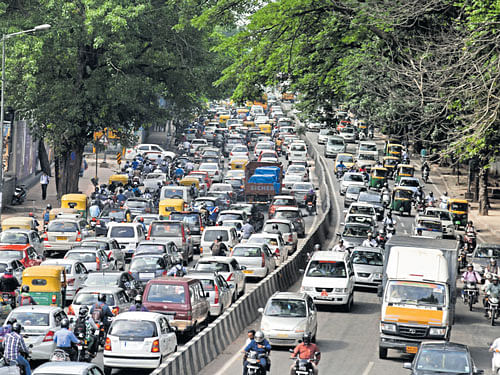
The proposed steel flyover from Basaveshwara Circle to Hebbal to provide a seamless commute to Kempegowda International Airport has been viewed by environmental experts and other citizens as another unnecessary inconvenience to the public. More than 800 trees that are more than 50 years old and some buildings of historical value will be razed to the ground.
If the two flyovers along Bellary Road and the elevated road towards the airport haven’t helped, people wonder how this new project will ease traffic. Environmental experts say the proposal to plant 10 trees for each tree being cut will not compensate for the existing canopy.
Environmentalist B N Viswanath points out that the city has already lost a lot of tree cover in the name of development.
“Bengaluru was once called the airconditioned city but the authorities haven’t bothered to bring back the old glory by retaining the existing green cover or planting new trees. Even if we plant 10 times the trees — and let us say all of them survive — the present two generations will not see its benefits (if they can be called
benefits). This is because cutting trees has become a continual process,” reasons Viswanath. He feels the existing small and medium steel flyovers don’t benefit many either. “It will not help the general public but only benefit politicians and contractors involved in the project,” he adds.
Tree lines are required in Bengaluru to keep the increasing pollution in check.
Despite petitions filed and public outrage against the project, the government authorities seem keen on going ahead with it. T V Ramachandra, associate faculty, Centre for infrastructure, Sustainable Transportation and Urban Planning, Centre for Sustainable Technologies, Indian Institute of Science, points out that there has been an increase in concrete area (paved surfaces), with the loss of 88 per cent of green cover and 79 per cent of water bodies over the last four decades (1970 to 2016).
“The city is on the verge of becoming unlivable with this kind of senseless, irresponsible and unplanned growth. If we continue this way, the landscape consist of 95 per cent of paved surfaces. This is unacceptable as there will not be sufficient and clean air and water or a clean environment,” explains Ramachandra. He says no government project has compensated for the tree loss satisfactorily so far.
“The city has 14.78 lakh trees for 95 lakh people. This means for every person there are seven trees. But to remove only respiratory carbon, we should have eight trees per person. The government must stop wasting public resources and take the city towards a healthy status,” he adds.
While experts warn that the proposed project will lead to serious ecological imbalance, citizens too don’t see the need for it at the cost of cutting down so many trees.
Shruthi Umesh, a chartered accountant, thinks it would be better if the government could chalk out alternative routes to divert traffic and ease the congestion than add to the existing flyovers.
“The proposed flyover will benefit only those going to the airport. It has taken so many years for 800 trees to grow and planting new saplings will not make up for their loss,” says Shruthi.
She also points out that planting more trees will control the rising pollution levels. “We see so many people affected with respiratory disease so we need more trees to survive the increasing traffic and pollution,” she says.
There are a lot of people who carpool and cycle to work, like V P Bijoy, an employee with Dell Technology. He has signed a petition opposing the construction of the steel flyover.
“The authorities should concentrate on widening
the roads, providing proper pedestrian paths and effectively managing the traffic flow rather than undertaking such massive projects that only cater to the interests of a small group. Most of these trees that will face the axe are more than 50 years old and cutting them is not the way forward,” reasons Bijoy.
The need of the hour, says Ramachandra, is to decongest the city.
“Flyovers are being proposed without proper assessment just to spend public money. We need to decongest the city and get back the city from the clutches of land, water and waste mafia,” he says.